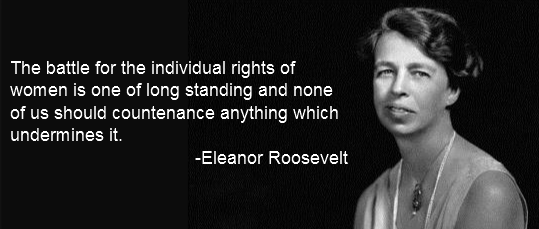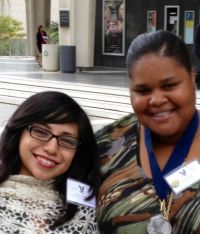Soraya Chemaly is a feminist activist who writes about gender and culture. She appears all over the internet, in places like The Guardian, Ms. Magazine, CNN, Salon, and The Huffington Post, and sits on our Advisory Council. Soraya will be at Women in Secularism 3 where she will be talking about Gender and Free Expression, Intersectionality and Humanism, and Online Activism.
MO: Did you always want to do what you are doing? Did you fall into it? How'd you get here?
SC: I think the way my childhood experiences made being a girl cognitively disjunctive, particularly religion in my case, made it almost inevitable. I've studied theology, history, gender, feminism for as long as I can remember. At university, I founded a feminist magazine but then after school I started to work that had nothing to do with these subjects. Then, about two years ago, when my children were on the verge of being teenagers, it struck me that we'd come to a standstill in terms of women's equality and parity, so I launched back in with a vengeance to make up for lost time!
MO: My family gets upset with me for deconstructing everything. Can you shut it off?
SC: Really can't! As I said to them long ago, this is not what I do, it's really is who I am. By asking me to stop (and they do!) they are falling into the classic trap that this perspective is tangential.
Mo: Harassment: We all get it. What do you get? How do you get through it?
SC: Street harassment has been a constant in my life since I was nine. I respond in different ways depending on the circumstances (because we all assess risk each and every time we feel the urge to respond), my mood, the place, etc. Now, a lot of the harassment I experience also happens online. There are people who really cannot imagine sharing public space – on line or off – civilly with women as equals.
Some, I ignore entirely. I figure, it's like bullying – if you don't like my opinion, it is not my problem, but your problem. Some of it I can't afford to ignore. One time in particular, I had to call the police. Another activist got death threats from the same person, we talked and it ended up with an FBI complaint. We all have to assess risks. Some people have the wherewithal to ignore harassment and threats. What is sad and understandable, however, is when people stop talking or censor themselves as a result. This is problematic for so many reasons. As far as engagement goes, you only have so much time and energy in you every day. There are some who are never going to change their minds so why on earth would you engage with them?
MO: Over the last few years, we've heard "where are all the women in atheism?" How many atheist conferences have invited you to speak? How do you think we should change the question to "why aren't you inviting women to speak?"
SC: I wrote this about that topic and recently, this, about the lack of women on tv, as experts, etc. Same holds true for conferences. I have never been asked to speak at another secular/atheist conference, but, in truth, I am not very immersed in the community. I think these issues are exactly the same in every industry and they have to do with deep structural issues related to whose time and work we value in society.
MO: Getting more women to the top areas of the movement would be key to change. How would we do that?
SC: What is required to get women to the top is have specific plans to identify systemic inhibitions to parity and execute them with benchmarks. Getting women to the top might open a flood gate, but the gate has to be opened in order for them to get to the top in the first place.
The immediate response, when someone says "where are the women," needs to stop being, "we are right here" which we've been saying for decades and change to, "if you are serious about diversity, where is your plan. If you are serious, you need to be able to say, these are the resources I am dedicating. These are the people, this is the time."
MO: Every one of your articles seem to be link heavy from beginning to end. This has to take a stunning amount of research.
SC: One of my defensive strategies for sure is to provide as much information as possible. If people want to argue with facts, then go for it. They can argue with the CDC, or the Department of Justice, or Cambridge, or whomever the source of information that I am citing might be.
MO: How has Twitter changed activism? Especially corporate activism? Twitter #FBRape campaign for instance.
SC: I think Twitter has been transformative for activists who, in the past, would have been unable to reach millions of people through media because they were marginalized. The #FBRape campaign that we organized brought together more than 100 organizations and tens of thousands of people globally. That would never have been possible without the transformative power of the Internet and tools like Twitter. I don't really see Twitter as separate from the other social media that we rely on – each has quite a specific demographic reach that enables activists to reach the likeminded, catalyze conversation and debate.
MO: Twitter feminists are hilarious. Their hashtag appropriations are always amusing in a snarky way. Have you appropriated a hashtag? Have you had one overrun?
SC: That's true. It's hard for me to think now, there have been so many good ones! #Liberaltipstoavoidrape is a recent one that comest to mine. I haven't had one overrun. There was a lot of potential for that to happen with #FBRape, and we knew that, but it didn't happen, even with more than 50K tweets. I think it was because the graphic nature of what we were sharing and protesting spoke for itself.
MO: What are some of the other campaigns you've run?
SC: I try and focus activism time on two areas: media diversity and sexualized violence because our storytelling shapes imagination and ambition and violence is a tool used to regulate inequality. To that end I try to support and participate in the activist efforts of organizations such as Stop Street Harassment, Take Back the Tech, Hollaback, FORCE: Upsetting Rape Culture, The Representation Project, the Women's Media Center and Everyday Sexism.



 SW: What changes do you see in the girls as they progress through the program?
SW: What changes do you see in the girls as they progress through the program?